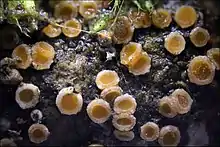Gyalectales
Gyalectales is an order of lichen-forming fungi in the class Lecanoromycetes. It contains 5 families, 15 genera and about 550 species.
| Gyalectales | |
|---|---|
 | |
| Apothecia of Gyalecta jenensis | |
| Scientific classification | |
| Domain: | Eukaryota |
| Kingdom: | Fungi |
| Division: | Ascomycota |
| Class: | Lecanoromycetes |
| Subclass: | Ostropomycetidae |
| Order: | Gyalectales Henssen ex D.Hawksw. & O.E.Erikss. (1986) |
| Families | |
|
Phlyctidaceae | |
Taxonomy
The Gyalectales were introduced in a 1974 publication by Aino Henssen and Martin Jahns,[1] but not formally published until 1986 by David Hawksworth and Ove Eriksson.[2]
Phylogeny
An early (2002) phylogenetics study showed that the order Ostropales, as was then circumscribed, was paraphyletic, and proposed that the Ostropales sensu lato included the Gyalectales and Trapeliaceae.[3] Although they had traditionally been considered to be only distantly related, molecular studies suggested a much closer phylogenetic relationship.[4][5] As a result, of the molecular data, Kauff and Lutzoni subsumed the Gyalectales into the Ostropales, as the latter name was published earlier (1932 vs. 1986).[3]
In 2018, Kraichak and colleagues used a recently developed "temporal phylogenetic" approach to identify temporal bands for specific taxonomic ranks. Based on this approach, clades that share a common ancestor between 176 and 194 Mya and a time window of 111–135 Mya correspond to order-level and family-level, respectively. The Gyalectales clade, consisting of the families Trichotheliaceae, Coenogoniaceae, Sagiolechiaceae, Gyalectaceae and Phlyctidaceae, has a crown node that falls within the temporal band for orders. For this reason the name Gyalectales was resurrected to represent the monophyletic clade.[6] Gyalectales itself is placed in Ostropomycetidae, one of two major subclasses in the Lecanoromycetes.
This proposed classification has been accepted in a later review of the temporal banding method for fungus systematics,[7] as well a 2020 update on ascomycete classification.[8]
Families and genera
This is a list of the families and genera contained within the Gyalectales, based on a 2020 review and summary of ascomycete classification.[8] Following the taxon name is the taxonomic authority, year of publication, and (for genera) the number of species:
- Coenogoniaceae Stizenb. (1862)
- Coenogonium Ehrenb. ex Nees – ca. 91 spp.
- Gyalectaceae Stizenb. (1862)
- Gyalecta Ach. – 50 spp.
- Ramonia Stizenb. – 24 spp.
- Semigyalecta Vain. – 1 sp.
- Phlyctidaceae Poelt ex J.C.David & D.Hawksw. (1991)
- Phlyctis (Wallr.) Flot. – 20 spp.
- Psathyrophlyctis Brusse – 1 sp.
- Sagiolechiaceae Baloch, Lücking, Lumbsch & Wedin (2010)
- Rhexophiale Th.Fr. – 1 sp.
- Sagiolechia A.Massal. – 3 spp.
- Trichotheliaceae Bitter & F.Schill. (1927)
- Clathroporina Müll.Arg – ca. 25 spp.
- Myeloconis P.M.McCarthy & Elix – 4 spp.
- Porina Müll.Arg. – ca. 145 spp.
- Pseudosagedia (Müll.Arg.) Choisy – 80 spp.
- Segestria Fr. – 70 spp.
- Trichothelium Müll.Arg. – 40 spp.
References
- Henssen, Aino; Jahns, H. Martin (1974). Lichenes. Eine Einfuhrung in die Flechtenkunde (in German). Stuttgart: Georg Thieme Verlag.
- Hawksworth, D.L.; Eriksson, O.E. (1986). "The names of accepted orders of ascomycetes". Systema Ascomycetum. 5: 175–184.
- Kauff, Frank; Lutzoni, François (2002). "Phylogeny of the Gyalectales and Ostropales (Ascomycota, Fungi): among and within order relationships based on nuclear ribosomal RNA small and large subunits". Molecular Phylogenetics and Evolution. 25 (1): 138–156. doi:10.1016/S1055-7903(02)00214-2. PMID 12383757.
- Bhattacharya, Debashish; Lutzoni, François; Reeb, Valérie; Simon, Dawn; Nason, John; Fernandez, Fernando (2000). "Widespread occurrence of spliceosomal introns in the rDNA genes of ascomycetes". Molecular Biology and Evolution. 17 (12): 1971–1984. doi:10.1093/oxfordjournals.molbev.a026298. PMID 11110913.
- Lutzoni, François; Pagel, Mark; Reeb, Valérie (2001). "Major fungal lineages are derived from lichen symbiotic ancestors". Nature. 411 (6840): 937–940. doi:10.1038/35082053. PMID 11418855. S2CID 4414913.
- Kraichak, Ekaphan; Huang, Jen-Pan; Nelsen, Matthew; Leavitt, Steven D.; Lumbsch, H. Thorsten (2018). "A revised classification of orders and families in the two major subclasses of Lecanoromycetes (Ascomycota) based on a temporal approach". Botanical Journal of the Linnean Society. 188 (3): 233–249. doi:10.1093/botlinnean/boy060.
- Lücking, Robert (2019). "Stop the Abuse of Time! Strict Temporal Banding is not the Future of Rank-Based Classifications in Fungi (Including Lichens) and Other Organisms". Critical Reviews in Plant Sciences. 38 (3): 199–253. doi:10.1080/07352689.2019.1650517. S2CID 202859785.
- Wijayawardene, Nalin; Hyde, Kevin; Al-Ani, LKT; Dolatabadi, S; Stadler, Marc; Haelewaters, Danny; et al. (2020). "Outline of Fungi and fungus-like taxa". Mycosphere. 11: 1060–1456. doi:10.5943/mycosphere/11/1/8.